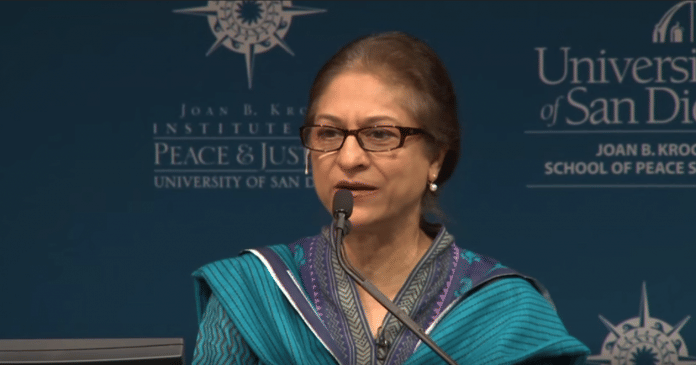Asma Jahangir’s real struggle began under General Zia-ul-Haq’s military government and its Islamisation process, the darkest period in Pakistan’s history.
A fearless street fighter and human rights crusader, Asma Jahangir had been a symbol of struggle for democracy and rule of law for more than four decades. In her death, the country has lost its bravest and most courageous soul. She was never afraid of taking on military dictators and religious bigots, who became her biggest nemeses.
Asma suffered prison and faced death threats, but nothing could deter her from fighting the cause she stood for. Whatever she did, she never deviated from her core principles; she never sought glory or tried to benefit from adversity.
Just a few days before her death, she addressed a protest rally for the recovery of missing persons allegedly picked up by the security agencies – a cause she has been campaigning for for the past several years.
Her activism started at a very young age when the military government in December 1971 detained her father, Malik Ghulam Jilani, a former civil servant and politician, under a martial law. No lawyer would take his case. Only 18 years old at that time, Asma filed the petition at the Lahore High Court.
“Courts were not new to me. Even before his detention, my father was fighting many cases. He had been to jail many times before, but we were not allowed to see him there. We always saw him in courts. So, for me, the court was a place where you dressed up to meet your father. It had a very nice feeling to it,” Asma Jahangir narrated in an interview to a Pakistani magazine.
After the high court dismissed the petition, young Asma went to Supreme Court. The court decided the petition in her favour several months later, though the military government had ended. It was the first time in Pakistan’s history that the apex court ruled the military government illegal, and General Yahya Khan to be a “usurper”. The historic case is known by her name.
But her real struggle began under another period of military rule almost a decade later. It was General Zia-ul-Haq’s military government, the darkest period in Pakistan’s history. As a part of its Islamisation process, the military government enforced Sharia laws that also changed the law of evidence to the disadvantage of women and non-Muslims.
Asma, along with other women activists, formed the Women’s Action Forum (WAF) to oppose the discriminatory laws in 1983. The group launched public protests that made Asma and her sister Hina the face of women’s rights movement in Pakistan. Then, she also experienced her first stint in prison.
That was also the period when Asma joined the lawyers’ movement against the military government. She was already an accomplished lawyer by then. Her office became the hiding place for the lawyers being chased by the security agencies. The police would not enter a woman lawyer’s office. In the 1980s, it was rare for women to join the legal profession. She faced serious problems when she started taking blasphemy and human rights cases.
She narrated an interesting story to a Pakistani magazine about her experience in a court when she was fighting a case against bonded brick kiln workers. “The judges would ask me why I had brought those people to the courts who stank. ‘You are here precisely for them’, I would respond.”
Her forceful arguments helped highlight the plight of the slave workers. The judges also started taking her more seriously.
Asma was the most outspoken campaigner against misuse of blasphemy laws that particularly targeted Christians and other non-Muslims. This also landed her in serious trouble. In the mid-1980s, General Zia’s handpicked consultative body passed a resolution accusing Asma of making blasphemous comments in a WAF meeting, and demanded the death sentence for her. The military government then enacted a new law that provided mandatory death sentences in blasphemy cases.
Asma refused to appear before the commission formed by the military government, or respond to the blasphemy charge. She was, however, acquitted after a WAF member produced the recording of the meeting, proving that the allegation was concocted.
She took many blasphemy cases that also made her a target of extremist Islamic groups. A few years ago, assailants entered her mother’s house, who lived next door. The family was held at gunpoint. After the incident, she sent her children away for protection. But she never left the country despite serious threats to her life. She led the famous lawyers’ movement for the restoration of judges sacked by General Musharraf’s military regime.
That movement also paved the way for the restoration of democracy in 2008. As chairperson of the Human Rights Commission of Pakistan, she took up the issue of enforced disappearances.
Asma drew the wrath of right-wing groups when in 2008, her picture with Bal Thackeray appeared in newspapers, though she had met him in her capacity as the United Nations Special Rapporteur on Freedom of Religion, investigating violence against Muslims in India.
Her sudden death has left a huge vacuum for liberal democratic forces.
The writer is a journalist and author of ‘The Scorpion’s Tail: The relentless rise of Islamic militant in Pakistan and Frontline Pakistan’.






